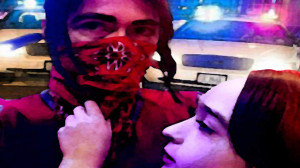 You may picture me stuck to my television 24/7 from the writings in this blog, but for a good chunk of the past year, I’ve been going out to sample theater in the D.C. area amid its current boom.
You may picture me stuck to my television 24/7 from the writings in this blog, but for a good chunk of the past year, I’ve been going out to sample theater in the D.C. area amid its current boom.
There is always a lot to choose from, but never more than when the Capital Fringe Festival is in business, putting on more than 100 shows in a dozen venues over three weekends in July.
That it coincides with the most unlivable time of year in the city, where humidity and unrelenting heat conspire to resemble a broken oven, only makes those who brave the conditions to seek out the shows that much more adventurous.
The presentation is a little like SXSW or other big intensive music showcases, where talent is kept to an hour or so and you could park at one theater and see four different shows in one night — or eight all day on weekends.
I volunteered to be part of the group hired to review the plays for the Washington Post, and ended up going to 10 of them over two weekends, though one I never got into because it was sold out (no special favors for the Post, even though the play I was supposed to see was by a Post columnist). (Later, I thought: Maybe because it was by a Post columnist that they kept me out!).
Anyway, Fringe is a place where theater companies can come up with new ideas that they often work on later into full productions. It’s a perfect setting for that increasingly popular form: the single person monologue. But there are also dance pieces and some burlesque shows. Perhaps because of the Fringe name there seems a great emphasis on sex and titillation though maybe that’s just how theater is marketed these days.
Some new themes emerge each year. There seemed a lot this year about the affects of war and PTSD (I didn’t see any of those though). The affects of Occupy DC last year led to three plays, and this year there was a fourth. (I did see that one).
Because of the restrictions, it doesn’t seem that a lot of deep, resonant theater can come out of Fringe, but there are sketchbooks of what some shows could be. One of those was an adaptation of a Civil War-era William Faulkner tale to modern day gentrifying D.C.
There was one marvelous comedy about a theta company putting on a terrible production that didn’t quite sustain its hour, and a woman who simply did what she always did: storytelling.
Here are the plays I saw at Fringe with links to the reviews: “43 1/2 Greatest Deaths of Shakespeare’s Greatest Tragedies” , “Married Sex” , “The Elephant in My Closet” , “Kubrilesque” , “Dark House” , “D.C. State Players Present Agamemnon” , “Impossible to Translate But I’ll Try” , “One Night in New York!” and “McPherson Madness” .